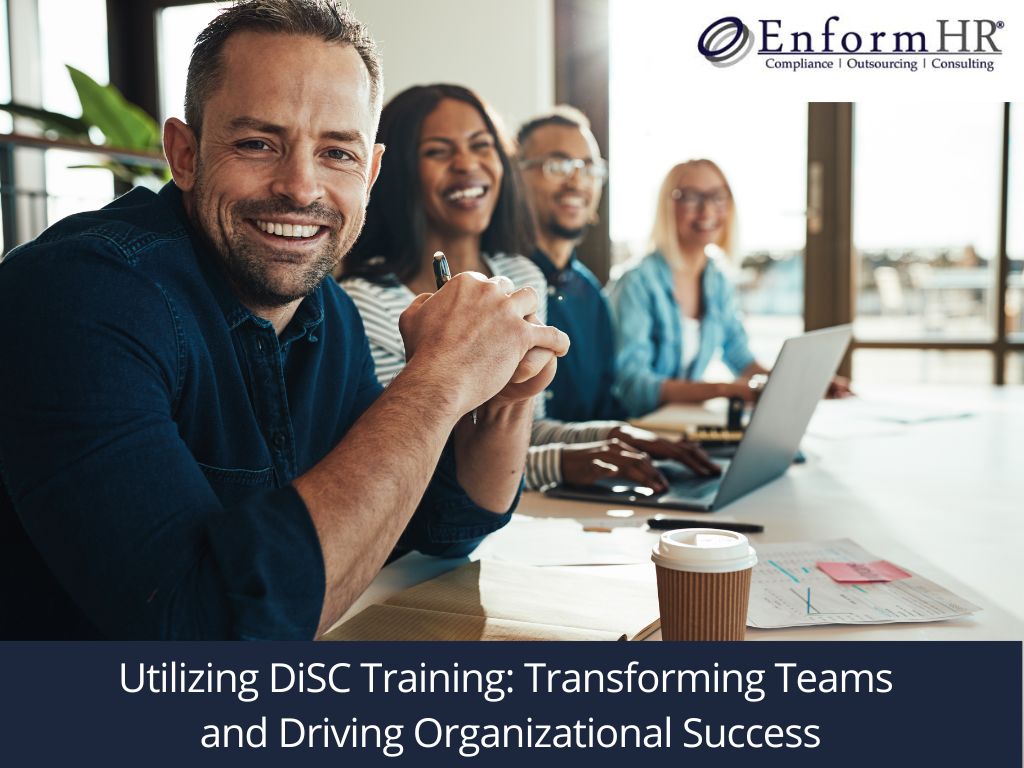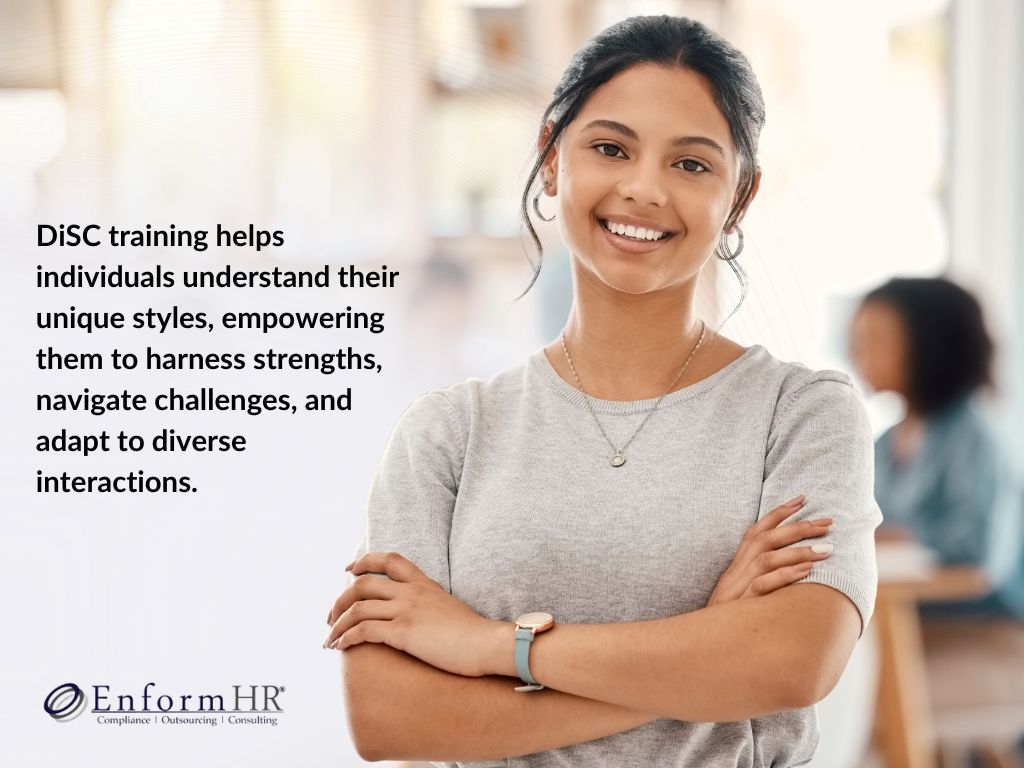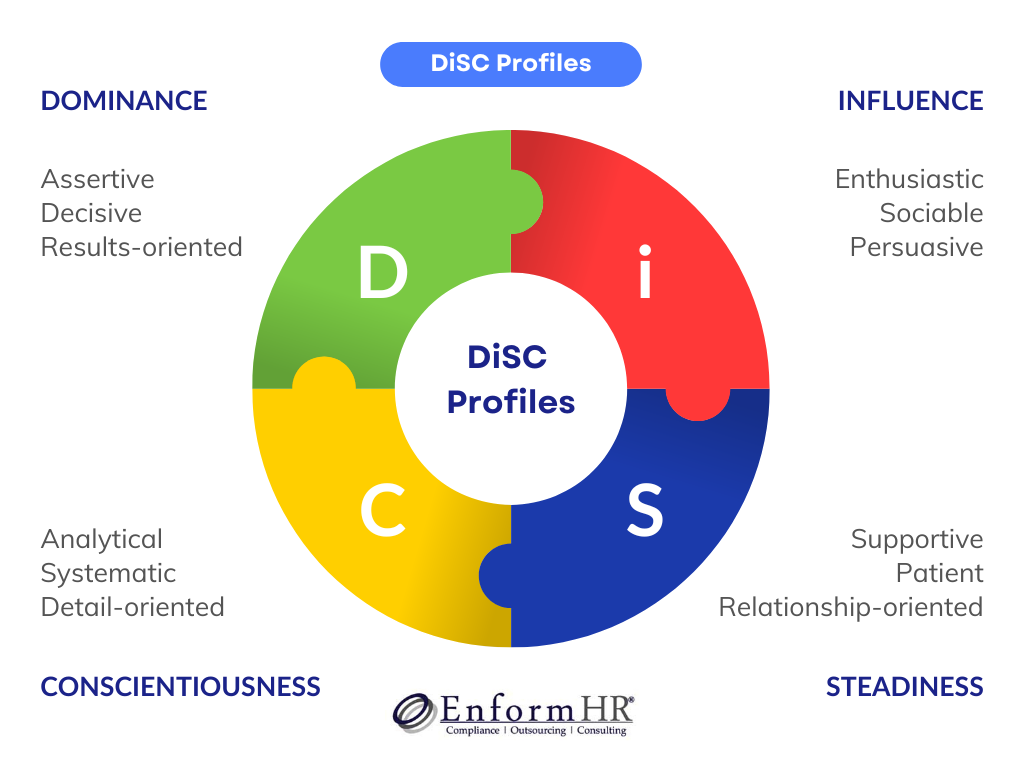Utilizing DiSC Training: Transforming Teams and Driving Organizational Success

In today’s workplace, collaboration and communication are critical skills to possess, and finding the right tools to enhance these skills can make all the difference. One such tool is DiSC, a powerful resource designed to enhance communication skills, give employees the tools to build more effective relationships, boost teamwork and productivity, and foster personal and professional growth by offering participants a comprehensive understanding of different workstyles and communication preferences.
Let’s take a deeper look into why DiSC training is not just beneficial but essential for driving your team’s potential and fostering success in your business.
Understanding DiSC Training
Derived from the DiSC model developed by psychologist William Moulton Marston in the 1920s, DiSC training has evolved into a comprehensive program utilized by more than 130,000 organizations and businesses worldwide. At its core, DiSC training revolves around the DiSC model, which categorizes communication and behavioral styles and preferences into four main categories: Dominance (D), Influence (i), Steadiness (S), and Conscientiousness (C).
Personality & Behavior Assessment
Participants take a short assessment to determine where they fall within the four main DiSC categories and then participate in instructor-led facilitation that includes hands-on workshops and interactive group activities to apply what they learn, engage with their team members, critically think about the material presented, and develop real strategies to apply in the workplace. Through this module, participants gain a deeper understanding of their tendencies and learn how to adapt their communication and interaction styles to connect more effectively with others.
Enhancing Self-Awareness and Ability to Adapt to Others

One of the key benefits of DiSC training is the heightened self-awareness it fosters. By uncovering their primary and secondary DiSC styles, participants gain valuable insights into their strengths, motivators, stressors, preferences, reactions to change, and areas for growth. By understanding this, individuals can be better equipped to navigate interpersonal dynamics with greater confidence and adaptability, whether in leadership roles, team environments, or with clients and customers.
Improving Communication and Collaboration
Effective communication lies at the heart of successful relationships and teamwork. DiSC provides participants with the tools and strategies to communicate more effectively across diverse personalities and preferences. By recognizing and respecting the communication styles of others, individuals can foster stronger connections, resolve conflicts constructively, and collaborate more efficiently towards shared goals, paving the way for increased productivity and work output.
Strengthening Leadership and Management Skills

For leaders and managers, understanding and leveraging the diverse styles within their teams is essential for driving performance and engagement. DiSC training equips leaders with the insights and techniques needed to adapt their leadership approach to the unique needs and preferences of each team member. Whether providing feedback, delegating tasks, managing workplace conflict, or inspiring motivation and engagement, DiSC-trained leaders can cultivate environments of trust, respect, and empowerment.
Improving the Strength of Workplace Culture
Fostering a culture of inclusion and empathy is imperative to a healthy work environment where your employees want to be. DiSC training promotes a deeper understanding of individual differences and encourages participants to embrace diversity as a source of strength. By cultivating empathy and appreciation for varying perspectives, organizations can create environments where every voice and style is valued, and every individual can flourish.
Driving Organizational Success
The benefits of DiSC extend beyond individual growth to organizational success. By providing employees at all levels with the skills and insights needed to communicate, collaborate, and lead effectively, organizations can enhance productivity, innovation, and employee satisfaction. Moreover, by building more effective relationships and a culture of mutual respect, organizations can attract and retain top talent, setting the stage for long-term success and sustainability.
DiSC Profiles: The Different Styles

Each style of DiSC represents distinct preferences in how individuals may communicate, interact, and approach tasks.
- Dominance (D): Individuals with a Dominant communication style can be assertive and results-oriented. They value directness, efficiency, and taking charge, focusing on achieving goals and overcoming challenges. They often prefer a straightforward and decisive communication approach.
- Influence (I): Influence communication styles can be sociable, enthusiastic, and people-oriented. They thrive on building relationships, fostering collaboration, and generating excitement. Influence communication styles can also be persuasive, and they enjoy sharing ideas and inspiring others.
- Steadiness (S): Steadiness is the communication style in which individuals can be supportive, patient, and relationship-focused. Prioritization is often harmony, stability, and teamwork. Steadiness communication styles can excel at listening attentively, providing steady support, and maintaining a calm, consistent communication approach.
- Conscientiousness (C): Individuals with a Conscientiousness communication style can be analytical, detail-oriented, and systematic. There is value in accuracy, thoroughness, and planning, with a preference to communicate with precision, provide well-researched information, and focus on quality and logic.
Understanding these DiSC communication styles helps individuals adapt their communication strategies to effectively connect with others, build rapport, and collaborate more productively in various personal and professional settings.
Misuses of DiSC
While DiSC is a tool that supports a variety of social and emotional contexts in the workplace, it can be misused. A common misuse of the tool is to use DiSC to stereotype or pigeonhole an individual based on their style. This occurs when a person’s abilities are dismissed or limited based on their DiSC style, which can lead to unfair generalizations. When a person prioritizes a certain behavioral tendency, this doesn’t mean they cannot “reach across the aisle” to tap into other styles or tendencies.
The beauty of DiSC is that we are a blend of all of the styles, but some styles are more dominant, and others take more energy. For example, someone who has an S-style is not incapable of exhibiting D-style tendencies, such as being decisive or results oriented, and someone with a D-style is not incapable of exhibiting S-style tendencies, such as being supportive, patient, and relationship focused.
Instead, the true strength of DiSC is when it becomes part of an organizational culture where individuals can openly discuss priorities and preferences and use their DiSC styles to build stronger relationships with each other, adapt to others’ needs, and are able to stretch outside their comfort zone effectively. This is the crux of the true, long-lasting impact DiSC can have in fostering success within your business.
Understanding Your DiSC Profile: Decoding Your Personality and Behavior Blueprint

Participants in DiSC receive a personalized profile to learn about their DiSC style, their motivators, stressors, and strategies for communicating with others. By analyzing your DiSC profile, individuals gain the ability to tailor their communication strategies to effectively engage with others based on their styles. Teams benefit by leveraging diverse strengths, minimizing conflicts, and enhancing collaboration; understanding the interpretation of DiSC profiles enables individuals and teams to communicate more effectively and achieve greater success in both personal and professional settings.
Conclusion
Interpersonal dynamics play a critical role in the success of your employees and your organization. Without essential communication tools and skills, businesses risk lower productivity, higher chances of workplace conflict, and increased turnover, all of which can affect your bottom line.
DiSC training offers a path to unlock untapped potential and build a strong organizational culture. By enhancing self-awareness, improving communication, strengthening leadership and management skills, improving the strength of workplace culture, and setting up your team to drive organizational success,
DiSC-trained organizations will be better equipped to navigate the complexities of today’s workplaces. As organizations continue to prioritize the development of their greatest asset, their people, DiSC training stands out as a valuable investment in unleashing the full potential of individuals and driving organizational excellence.
At EnformHR, our DiSC-certified practitioners know exactly how to bring your organization to the next level. Reach out to us today for a free consultation!


